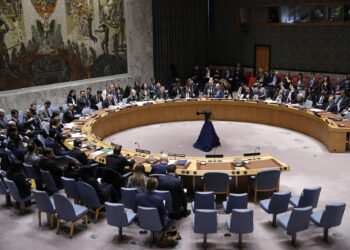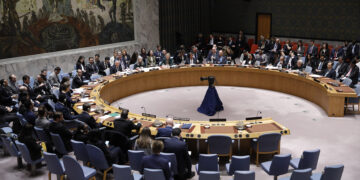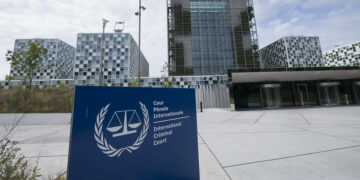Sarah Leah Whitson is the Executive Director of DAWN.
Sarah Leah Whitson is the executive director, and Mike Eisner is the General Counsel and Chief Operating Officer of DAWN (Democracy for the Arab World Now).
Published in The Nation on December 9, 2020
The Senate is expected to vote this week on whether to block the Trump administration's proposed $23 billion arms sale to the United Arab Emirates. Congressional action is unlikely to stop the deal, but it will bring the issue to the forefront for the incoming administration. Indeed, the UAE arms deal will pose the first major test of the new administration's commitment to end military support for abusive governments in the Persian Gulf. The Biden administration must seize the opportunity to roll back a deal that would cause devastating harm to both the people in the Middle East and America's standing in the region.
The proposed arms sale, involving 50 stealth F-35 strike fighter jets, 18 MQ-9 Reaper drones, and $10 billion worth of bombs and other munitions, violates the principle of "first, do no harm" that is championed by both liberal and conservative foreign policy makers. That principle derives from a recognition that policy-makers have too often, under the guise of protecting national security or promoting democracy, inflicted devastating damage upon the world and our own national interest. The harm in the case of the UAE arms deal is wholly foreseeable. Just as you can predict the consequence of selling a loaded pistol to a serial murderer, you can anticipate the damage that will be wrought by this arms deal. The UAE has a well-documented track record of using its advanced weaponry to launch aggressive and unlawful incursions into other countries, engaging in systematic human rights violations and war crimes along the way.
In Yemen, where the UAE and Saudi Arabia have led a pretend nine-state coalition of Arab states (the other seven Arab countries in the coalition have lent their names, but have mostly stood on the sidelines of the conflict), air strikes have decimated the country, causing thousands of civilian casualties, hitting, according to the UN's Human Rights Council, "residential areas, markets, funerals, weddings, detention facilities, civilian boats and even medical facilities." The UAE was directly implicated in one particularly heinous strike on a boat carrying Somali refugees, killing 32. To control south Yemen, the UAE has relied on extremist armed groups linked to Al Qaeda that operate prisons where torture, rape, and murder have been rampant. What's come of the UAE's interference in this country? Nothing but destruction and brutality, likely to sow generations of Yemeni hatred and resentment.
The UAE military has remained true to form in Libya, deciding to use its advanced weapons to intervene in a conflict thousands of miles away on another continent. It has armed warlord Khalifa Haftar (in total disregard of the UN arms embargo), built a military base in eastern Libya, and carried out drone and air strikes against numerous civilian targets. The upshot? An endless quagmire where a UAE despot spoils any possible peace.
Secretary of State Mike Pompeo has rather incredibly stated that the arms deal would enable the UAE to defend itself against Iran. The truth is that in a war with Iran without US support, the UAE, a country with a mere 1 million citizens, would be overrun within days by the battle-hardened Iranian military, which would relish the chance for some target practice at the gleaming skyscrapers of Dubai. Moreover, the UAE's Crown Prince Mohammed bin Zayed, or MBZ as he is commonly known, has no coherent or discernible military strategy. His military adventures in Yemen and Libya certainly have not made Iran weaker, and despite its efforts, the UAE has made no real advances in either country, only sowing destruction and suffering and prolonging the conflicts.
MBZ's military interventions have also damaged US interests. He has exacerbated regional instability and lashed out at neighbors near and far—from Iran, Qatar, and Yemen to Syria, Libya, and Turkey. He has also tethered the United States to guilt by association in the eyes of the region's people, given America's role in aiding and abetting the UAE's military horrors.
If the past serves as prologue, the introduction of more sophisticated weapons will only expand the scale of the UAE's destruction and further undermine US national security. The UAE's neighbors might well become the site of other humanitarian catastrophes, as MBZ, emboldened by the added firepower, searches for fresh targets. Indeed, not long ago, MBZ and Saudi Crown Prince Mohammed bin Salman came close to invading Qatar before being dissuaded by then–Secretary of State Rex Tillerson.
The proposed arms deal would also escalate the regional arms race, as other countries—in particular, Iran—seek to counter the UAE's arsenal upgrade. Israeli Prime Minister Benjamin Netanyahu reportedly agreed to the arms deal with the understanding that Washington would provide more advanced weapons to Israel to ensure that it maintains its "qualitative military edge." An arms race will in turn increase the risk of strategic miscalculation and regional military conflict, which could well draw US soldiers back into the fray.
The vote this week on four separate Joint Resolutions of Disapproval, introduced by a bipartisan group of senators, would block the arms deal. Democratic Senate minority leader Chuck Schumer has expressed support for the resolutions, according to HuffPost, signaling a potential consensus among Democratic senators against the deal. Even so, the senators' efforts will likely be more symbolic than effectual. The resolutions must pass both houses of Congress and then withstand a presidential veto in order to become law.
Fortunately, despite efforts by the Trump administration to expedite the sale, delivery of the F-35s and the other weapons will likely take several years, providing ample opportunity for the incoming Biden administration to creatively undo the arms deal on national security grounds. Twenty-nine NGOs—including our group, DAWN—have signed a letter calling upon the incoming administration to do just that. To first, do no harm, the incoming Biden administration must do everything in its power to quash the proposed UAE arms deal.






































